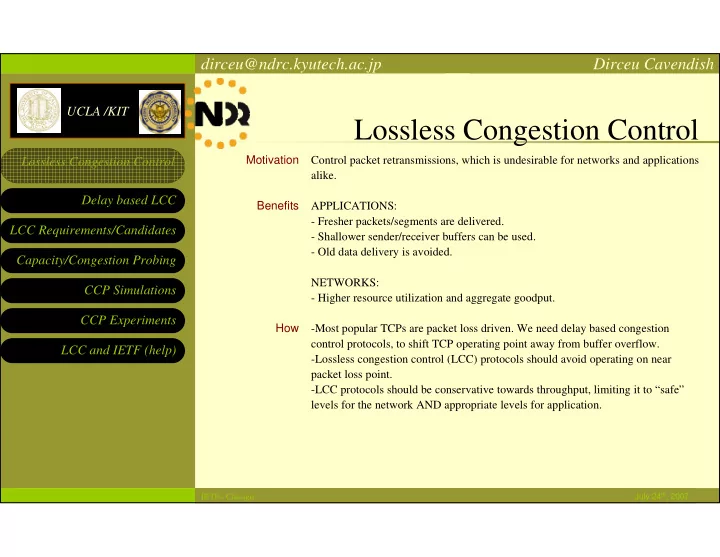

dirceu@ndrc.kyutech.ac.jp Dirceu Cavendish UCLA /KIT Lossless Congestion Control Motivation Control packet retransmissions, which is undesirable for networks and applications Lossless Congestion Control alike. Delay based LCC Benefits APPLICATIONS: - Fresher packets/segments are delivered. LCC Requirements/Candidates - Shallower sender/receiver buffers can be used. - Old data delivery is avoided. Capacity/Congestion Probing NETWORKS: CCP Simulations - Higher resource utilization and aggregate goodput. CCP Experiments How -Most popular TCPs are packet loss driven. We need delay based congestion control protocols, to shift TCP operating point away from buffer overflow. LCC and IETF (help) -Lossless congestion control (LCC) protocols should avoid operating on near packet loss point. -LCC protocols should be conservative towards throughput, limiting it to “safe” levels for the network AND appropriate levels for application. July 24 th , 2007 IRTF - Chicago
dirceu@ndrc.kyutech.ac.jp Dirceu Cavendish UCLA /KIT Delay based LCC Delay based TCPs -Listens to segment rtts. Most OSs support at least microsecond rtt Lossless Congestion Control measurement accuracy. -Regulate transmission rate to keep segments’ rtts at an acceptable Delay based LCC level. -Disambiguates between loss and congestion LCC Requirements/Candidates Capacity/Congestion Probing Delay based LCC - Buffer filling levels are kept low - Network buffers are used to cope with excessive in flight segments CCP Simulations during network transients - Focuses on network utilization with packet loss control. CCP Experiments CC operating points -Full buffer (losses) LCC and IETF (help) -Empty buffer (throughput degradation) -Anything in between (loss/throughput tradeoff) July 24 th , 2007 IRTF - Chicago
dirceu@ndrc.kyutech.ac.jp Dirceu Cavendish UCLA /KIT LCC Requirements & Candidates Premisses - Retransmissions are undesirable for both applications and networks Lossless Congestion Control - Throughput at any cost is undesirable (fairness, discard at receiver). Delay based LCC Delay based LCC - Senders monitor rtts. - Senders regulate their TX rate so as to keep rtts at a given operating point. Queues LCC Requirements/Candidates are kept away from their overflow levels. - Most delay based TCPs do not operate at “knee of the congestion curve”, but much Capacity/Congestion Probing above, incurring high losses, as a trade-off for high throughput. CCP Simulations LCC Candidates [Leith07] D. Leith, R. Shorten, G. McCullagh, J. Heffner, L. Dunn, F. Baker, “Delay-based AIMD Congestion Control”, in PFLDnet, February 2007. CCP Experiments [Cavendish07] D. Cavendish, C. Marcondes, M. Gerla, LCC and IETF (help) “Capacity and Congestion Probing: Towards a Stable and Lossless TCP”, Submitted to Infocom 2008. July 24 th , 2007 IRTF - Chicago
dirceu@ndrc.kyutech.ac.jp Dirceu Cavendish UCLA /KIT Capacity & Congestion Probing TCP - Based on control theoretical approach [Cavendish04] Proportional + Integral controller Lossless Congestion Control - Estimate session path bottleneck capacity and storage space - cwnd(k) = f ( storage(k), inFlight(k) ); Delay based LCC LCC Requirements/Candidates -Timeout driven window regulation CCP control properties Capacity/Congestion Probing -Guaranteed window convergence -Allows throughput vs loss tradeoff tuning CCP Simulations -Capacity: Packet dispersion CCP Experiments -Buffer size: max rtt TCP-CCP Protocol -Buffer level : current rtt LCC and IETF (help) July 24 th , 2007 IRTF - Chicago
dirceu@ndrc.kyutech.ac.jp Dirceu Cavendish UCLA /KIT Parking Lot Simulation Results Lossless Congestion Control Estimators’ accuracy Delay based LCC LCC Requirements/Candidates Capacity/Congestion Probing Performance comparison CCP Simulations CCP, NewReno, FAST CCP Experiments CCP: 40/50 % less gput 20/200x less loss LCC and IETF (help) Dynamics NETWORK SCENARIO Parking Lot topology 1Gbps all links, 15msec delays 140 flows - 40 long lived (4Gfiles) - 100 short lived (1MB Pareto) 800Mbps load on core links July 24 th , 2007 IRTF - Chicago
dirceu@ndrc.kyutech.ac.jp Dirceu Cavendish UCLA /KIT Transoceanic Experiments Lossless Congestion Control Delay based LCC LCC Requirements/Candidates Capacity/Congestion Probing BIC/Highspeed/CCP CCP Simulations Dynamics CCP Experiments LCC and IETF (help) NETWORK SCENARIO Clean Pipe 1Gbps narrower link 208msec rtt UCLA/KIT Pathrate/pathload tested Large socket buffers Iperf application All (9) Linux supported algos July 24 th , 2007 IRTF - Chicago
dirceu@ndrc.kyutech.ac.jp Dirceu Cavendish UCLA /KIT LCC and IRTF DCCP - Offers multiple congestion control options: Lossless Congestion Control + TCP-Like LCC could fit here Delay based LCC + TFRC Equation based rate control: r(t) = f(loss_rate) LCC Requirements/Candidates - Active on accommodating applications such as RealAudio, Internet Telephony, and Interactive Games into a congestion control framework. Capacity/Congestion Probing LCC -Sequence numbers are useful for rtt tracking purposes CCP Simulations -Nanosecond level accuracy is useful for certain path scenarios CCP Experiments Next Steps? -Our actions? -Volunteers? LCC and IETF (help) July 24 th , 2007 IRTF - Chicago
dirceu@ndrc.kyutech.ac.jp Dirceu Cavendish UCLA /KIT Thank you ! Cesar Marcondes – UCLA Collaborators Lossless Congestion Control Mario Gerla – UCLA Yuji Oie - KIT Delay based LCC [Cavendish07] D. Cavendish, C. Marcondes, M. Gerla, References LCC Requirements/Candidates “Capacity and Congestion Probing: Towards a Stable and Lossless TCP”, Submitted to Infocom 2008. Capacity/Congestion Probing [Leith07] D. Leith, R. Shorten, G. McCullagh, J. Heffner, L. Dunn, F. Baker, CCP Simulations “Delay-based AIMD Congestion Control”, in PFLDnet, February 2007. CCP Experiments [Cavendish04] D. Cavendish, M. Gerla, S. Mascolo, “A Control Theoretical Approach to Congestion Control in Packet Networks”, LCC and IETF (help) In Transactions on Networking, Vol. 42, Issue 5, pp. 893-906, Oct. 2004. July 24 th , 2007 IRTF - Chicago
Recommend
More recommend